YOHO NOTES
I am working to get Cassandra on Amazon. Stay tuned. They left a link to order the paperback HERE, but it won’t take reviews. I have a fantastic cover designer but he ghosts me for weeks at a time.
To watch the complete Pacific Bitcoin conference free on YouTube, click HERE. Alex is one of the lecturers.
DEC 31, 2022
Introduction
The most frequent question I get asked is: “How did you end up doing this?”
Most people can’t imagine why or how someone would become a huge champion of fossil fuels, of all things.
And growing up, I never imagined I would devote my life to this cause.
So, for those of you who are interested, here’s what happened.
Part 1: Deciding to become a practical philosopher
Sometimes people assume that I became a fossil fuel champion due to some combination of 1) fossil fuel industry money and 2) my personal background—e.g., my family was involved in fossil fuels, or I grew up in some pro-fossil fuel area.
Both couldn’t be more wrong.
I became a fossil fuel champion before I even knew anyone in the industry, let alone had a financial connection.
I had no family connection to fossil fuels.
And I grew up in a liberal area, Chevy Chase, MD, that had no connection to fossil fuels.
The key to understanding why I became a fossil fuel champion is a decision I made when I was a 19-year-old computer science major at Duke University: to become a philosopher—specifically, a practical philosopher.
Many think of philosophy as an impractical subject.
But at its core, philosophy is the most practical subject, because it studies the fundamental ideas that guide all our thinking and action.
Different philosophical ideas drive hugely different outcomes.
The practicality of philosophy made me fall in love with the field.
I decided to become a practical philosopher—using my understanding of philosophical thinking methods, assumptions, and values to help people think more clearly about complex issues.
Because I wanted to become a practical philosopher and get good as fast as possible, I made another controversial decision: to leave academia and not pursue a PhD—because I knew that I could develop my abilities much faster via self-directed learning and practical experience.
On several occasions in college I received physical threats for expressing my views. I decided that I would at some point learn Brazilian Jiu-Jitsu. I eventually got my black belt in 2014. BJJ has kept me safe a number of times by helping me deescalate threatening situations.
I thought that a good step toward becoming a practical philosopher was to start by writing about political issues, because there was some market there for interesting thinking. I “turned pro” in my junior year of college, selling a couple op-eds for $250 each.
The good news for my early writing career was that people would publish me and pay me. The bad news was that I was very slow, often picking projects that ended up paying way below minimum wage.
At 23 I was in debt and lived with my parents for 6 months. But I was improving…
At 24 my thinking and writing were improving and I got a major opportunity: a job as a writer at the Ayn Rand Institute in SoCal. I could write full-time andwork with some smart people including ARI CEO Yaron Brook philosopher Onkar Ghate—who would be especially helpful in my energy thinking.
In my early career as a freelancer and in the think-tank world, I wrote articles applying philosophy to every conceivable subject: healthcare, economics, foreign policy, biotech, etc.
But I never found a subject that I wanted to become an expert in—until I found energy.
Part 2: Deciding to become an energy expert
My favorite subjects to apply philosophy to are 1) hugely consequential for human life and 2) being thought about in a very wrong way.
In 2007, at age 27, I realized that energy policy met both criteria.
I realized that energy policy is incredibly consequential because the more cost-effective energy is, the more human beings can use machines to be productive and prosperous. The less cost-effective energy is, the more human beings must use manual labor—which dooms them to poverty.
I realized that energy policy is being thought about in a very wrong way, because it commits a very basic thinking error with regard to our leading source of energy, fossil fuels: it considers only their negative side-effects while ignoring their benefits.
It should be common sense that when we’re evaluating what to do about a product or technology, we consider not only its negative side-effects but also its benefits. For example, we do this when deciding whether to take a prescription drug. But not with fossil fuels.
Here are 3 crucial facts about fossil fuels’ benefits I realized were widely ignored:
1. Fossil fuels are a uniquely cost-effective form of energy.
2. Cost-effective energy is essential to human flourishing.
3. Billions are suffering and dying for lack of cost-effective energy.
The fact about fossil fuels that most changed my mind was: fossil fuels give us an incredible ability to master climate. Most people have no idea that fossil fuels have not only contributed to 1° C of warming in the last 100+ years, but also to a 98% decline in climate-related disaster deaths!
I learned that the widely-respected IPCC does not acknowledge the massive decrease in climate-related disaster deaths driven by fossil fuels. This is as disreputable as a panel on polio that doesn't acknowledge the massive decrease in polio deaths driven by the polio vaccine.
I also learned that in addition to ignoring the benefits of fossil fuels, many of our leading thinkers and institutions have a track record of catastrophizing the side-effects of fossil fuels—predicting fossil fuels would make life terrible when in fact they made it far better.
For example, as I document in Chapter 2 of Fossil Future, our leading thinkers and institutions predicted for decades that fossil fuels would drive catastrophic resource depletion, pollution, and climate danger, whereas in fact FFs drove huge improvements in all these areas.
My philosophy background enabled me to understand why our leading thinkers made the errors of ignoring the benefits of fossil fuels and catastrophizing the side-effects: they accept, sometimes knowingly sometimes not, anti-human assumptions and anti-human values.
The major philosophical reason leading thinkers catastrophize the side-effects of fossil fuels is a false assumption I call the “delicate nurturer assumption”: Earth unimpacted by humans exists in a delicate, nurturing (stable, safe, sufficient) balance that human impact ruins.
Insofar as you believe that Earth is a “delicate nurturer,” you believe that human beings are “parasite polluters” whose impact on Earth will inevitably lead to disaster. That’s why catastrophists keep thinking their next catastrophe prediction will be the one that’s right.
The truth is that Earth is not a “delicate nurturer” but “wild potential”(dynamic, deficient, dangerous) and human beings are “producer-improvers” who can impact it for the better. When you recognize this truth you value human impact and expect us overcome problems.
The major philosophical reason leading thinkers ignore fossil fuels’ benefits is that their primary moral goal is not advancing human flourishing on Earth but eliminating human impact on Earth. To them fossil fuels’ benefits are unimportant or even bad (because they impact Earth a lot).
Observe that leading opponents of fossil fuels are not just hostile to fossil fuels but also to nuclear, hydro, and the mining and development involved in solar and wind. Always because of their impact on Earth. Clearly they prioritize eliminating impact over human flourishing.
Realizing that leading thinkers and institutions were driven by anti-human ideas to ignore fossil fuels’ benefits and catastrophize their side-effects made me scared and motivated—scared their policy prescriptions were deadly, and motivated to learn the truth for myself.
I decided to become an energy expert who used pro-human philosophical ideas to evaluate our energy choices and made good policy recommendations. Above all I wanted to learn about the full benefits and side-effects of fossil fuels and spread the truth far and wide.
When I looked at the full benefits and side-effects of fossil fuels from a human flourishing perspective, I quickly discovered that, as the subtitle of my book Fossil Future says, “global human flourishing requires more oil, coal, and natural gas—not less.”
Part 3: Starting a pro-human energy movement
To publicize my pro-human approach to energy I decided to start my own organization that would be the base of a pro-human energy movement as well as a pro-human approach to other forms of industry: the Center for Industrial Progress.
I decided to make my organization a for-profit business, on the premise that if my ideas were as valuable as I thought the public would be willing to pay enough for my books and speeches for me to be able to make a decent living. And I liked the discipline of the market.
For more on my business model and how I have maintained intellectual independence, read this article and/or watch the last 30 minutes of this interview with Jordan Peterson.
My initial strategy to prove the value of my pro-human energy thinking was to make my approach known by taking the fight to people I disagreed with: by challenging them to public debates and even debating them at their rallies.
I debated a Greenpeace rep in 2011, leading anti-fossil fuel activist Bill McKibben in 2012, a Sierra Club leader in 2013, etc. While I didn’t know anywhere near as much then as now, these debates started showing the merits of my pro-human approach.
I also took my views to anti-fossil-fuel protests, including Occupy Wall Street in 2011 and the People’s Climate March in 2014–where I stood against 300,000 protestors with a giant I Love Fossil Fuels sign.
I did debates and crashed protests to prove a point: my pro-human way of thinking about energy is right, my conclusion that we need more fossil fuels is right, and my conviction in these things is far greater than the conformist pseudo-conviction of the anti-fossil-fuel movement.
In 2013, an agent watched my debate with Bill McKibben and was impressed. He read an essay I had written on “the moral case for fossil fuels” and thought he could get a major publisher to pick it up. I was skeptical, but he was right—and a game-changing book was born.
Part 4: The Moral Case for Fossil Fuels—influential and vindicated, yet ignored by the mainstream
I was given 6 months to write The Moral Case for Fossil Fuels and somehow I did this. Two big helps were my researcher Steffen Henne, who knows a ton and is good at catching errors, and my philosopher friend Greg Salmieri, who helped me quickly clarify my thinking.
For a book that took 6 months and many did not expect to succeed, The Moral Case for Fossil Fuels did incredibly well, becoming a New York Timesbestseller. It influenced many elected officials as well as many CEOs—some of whom finally started standing up for their beleaguered industry.
Most importantly, the book was right. It correctly predicted that any negative impacts of fossil fuel use would be outweighed by the unique benefits of fossil fuels to human flourishing—including their unrivaled ability to provide low-cost, reliable energy to billions.
Even though it was very popular, The Moral Case for Fossil Fuels was largely ignored by mainstream thinkers and outlets. Instead of engaging me they preferred to pretend that I, my book, and my pro-human arguments didn’t exist. But this strategy was doomed to fail as I found new ways to spread my ideas.
Part 5: Energy Talking Points: Pro-human, pro-freedom messaging and policies for politicians and citizens
In 2020, I created Energy Talking Points to solve a crucial problem: elected officials as well as citizens who wanted to promote pro-energy, pro-freedom policies didn’t have good messaging—the right words for the right situation.
The first phase of Energy Talking Points was to a create a website, EnergyTalkingPoints.com, that offered concise, powerful, well-referenced messaging on many energy issues from a pro-human, pro-freedom perspective. This got great feedback from politicians and active citizens.
After pioneering a new caliber of messaging with Energy Talking Points, I created a program exclusively for major elected officials and staff to give them custom, current guidance on energy messaging. This program now has members from 170+ major political offices.
My energy talking points greatly increased the world’s exposure to my pro-human energy thinking and the case for more fossil fuel use. This has made it impossible for mainstream thinkers to ignore my latest and most important project: Fossil Future.
Part 6: Fossil Future: An irrefutable and unstoppable case for more fossil fuel use
While pro-human thinking about fossil fuels has been on the rise, it has been no match for the growing scope of the anti-fossil-fuel movement, which has totally mainstreamed the murderous goal of rapidly eliminating fossil fuels.
I spent a lot of time thinking about what I could do, as the world’s leading champion of fossil fuels, to change the world’s deadly anti-fossil-fuel trajectory. I decided the most impactful thing I could do was write a new book that was 10 times better than The Moral Case for Fossil Fuels.
Based on the success of The Moral Case for Fossil Fuels, which I wrote in 6 months knowing much less about energy and persuasion than I do now, I believed that a new level of impact was possible if I wrote a totally new book about fossil fuels.
I spent over 3 years making Fossil Future the clearest, most persuasive, most comprehensive, most current book possible about fossil fuels and what our policy should be going forward. I believe it’s at a different level than any other energy book—and many agree with me.
Fossil Future begins by proving that our leading institutions are evaluating fossil fuels based on an anti-human philosophical framework. It offers an alternative “human flourishing framework.” Both its exposé of the establishment and its alternative framework are hard to refute.
As Fossil Future shows, once you look at the benefits and side-effects of fossil fuels from a human flourishing perspective, everything changes. Fossil fuels go from a world-destroying addiction to a world-saving value that actually makes us safer from climate.
Happily, Fossil Future is already having a huge positive impact. In its first week it outsold every book on the NYT bestseller list but one, in some cases, selling 5 times more. It has gotten great reviews from leading thinker after leading thinker. Here are some of them.
Most excitingly, I get endless comments from readers about how Fossil Future changed how they thought about energy and climate. This shows that Fossil Future really is great at winning hearts and minds.
Attempts to refute Fossil Future have uniformly been straw-men that totally misrepresent the contents of the book.
The most prominent attempt to attack Fossil Future shows the strength of the book and the weakness of my opponents. The Washington Post attempted to smear me, a lifelong individualist, as racist. I destroyed their attempt. This is the best they can do?
Energy Talking Points by Alex Epstein
How I stopped The Washington Post from canceling me and Fossil Future
Two weeks ago, I wrote here about The Washington Post’s plan to cancel me and Fossil Future: Yesterday I woke up to find out from my publicist that The Washington Post, in response to the book about energy and climate they had been sent (Fossil Future…
My ideas are winning. At this point it’s nearly impossible to find a prominent person who will debate me, particularly in an extended time format where they won’t be saved by the bell.
Pro-human thinking about energy can’t be stopped. There is now a fast-growing group of “energy humanists” including Michael Shellenberger, Bjorn Lomborg, and Steve Koonin, who are all compellingly arguing that the benefits of fossil fuels outweigh their negative side-effects.
I’m just getting started. I am going to keep giving speeches championing fossil fuels, keep appearing in the media, keep debating anyone who will debate me, and keep working with elected officials to develop and promote pro-human, pro-freedom energy policies.
If you a student or educator, you can actually get a free copy of my book Fossil Future, courtesy of Young America’s Foundation, by going here.
Please join me in changing the world of energy. You can make a huge impact by spreading the word about my work—especially EnergyTalkingPoints.com and Fossil Future. These resources are incredibly persuasive, and if they’re spread widely enough, the truth will be unstoppable.
PS If you’re on Twitter, please share my Twitter thread on this issue.
Popular links
EnergyTalkingPoints.com: Hundreds of concise, powerful, well-referenced talking points on energy, environmental, and climate issues.
My new book Fossil Future: Why Global Human Flourishing Requires More Oil, Coal, and Natural Gas—Not Less.
“Energy Talking Points by Alex Epstein” is my free Substack newsletter designed to give as many people as possible access to concise, powerful, well-referenced talking points on the latest energy, environmental, and climate issues from a pro-human, pro-energy perspective.
Share Energy Talking Points by Alex Epstein
How to help Fossil Future spread even more
To help my new book Fossil Future spread even more, you can:
Buy one or more copies (obviously)
Spread the word in an email, newsletter, blog or column easily by using or modifying this text. (When you do so, let me know at alex@alexepstein.com.)
Use or edit one of these pre-made social media posts: pre-made Twitter post | pre-made LinkedIn post | pre-made Facebook post.
Share this viral tweet of mine announcing the book.
Preview YouTube video McKibben vs. Epstein Debate on Fossil Fuels -- Full Audio
McKibben vs. Epstein Debate on Fossil Fuels -- Full Audio
Preview YouTube video Alex Epstein at People's Climate March: Part 1
Alex Epstein at People's Climate March: Part 1
Once more, I “copied another student’s homework.” I hope you don't mind. Let me know what you think in the comments.

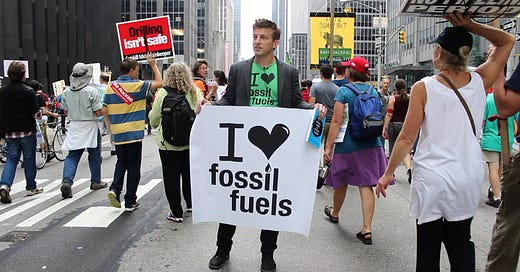




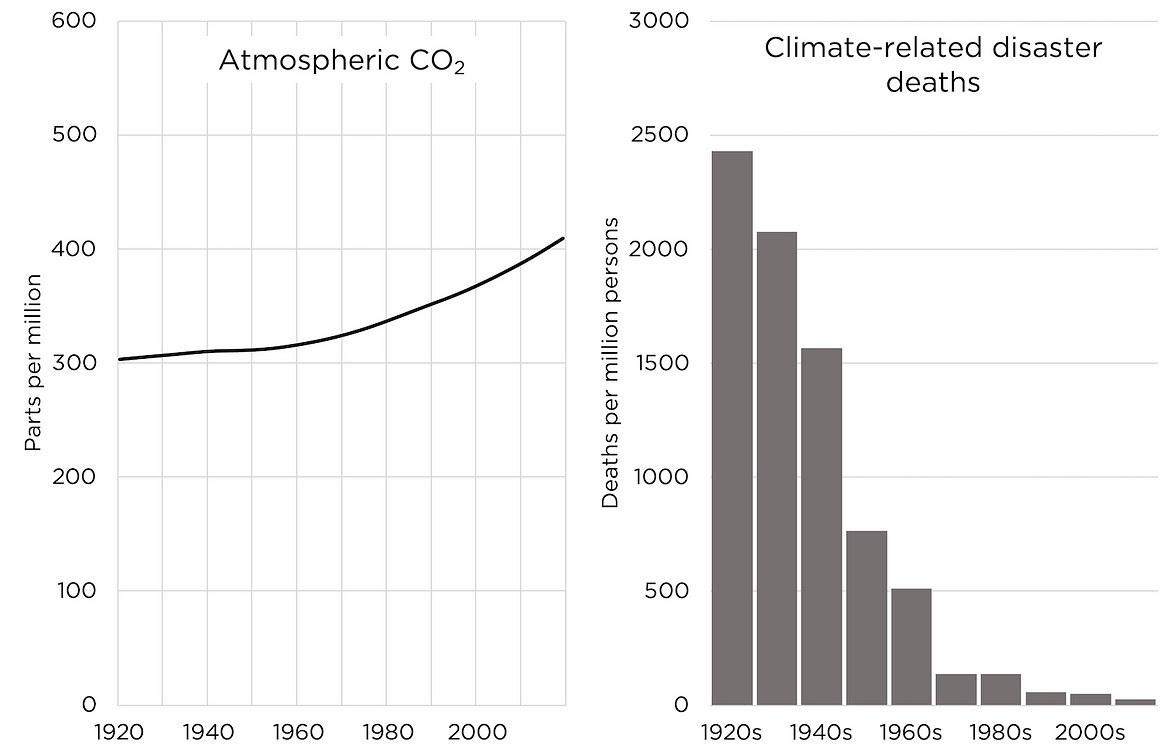
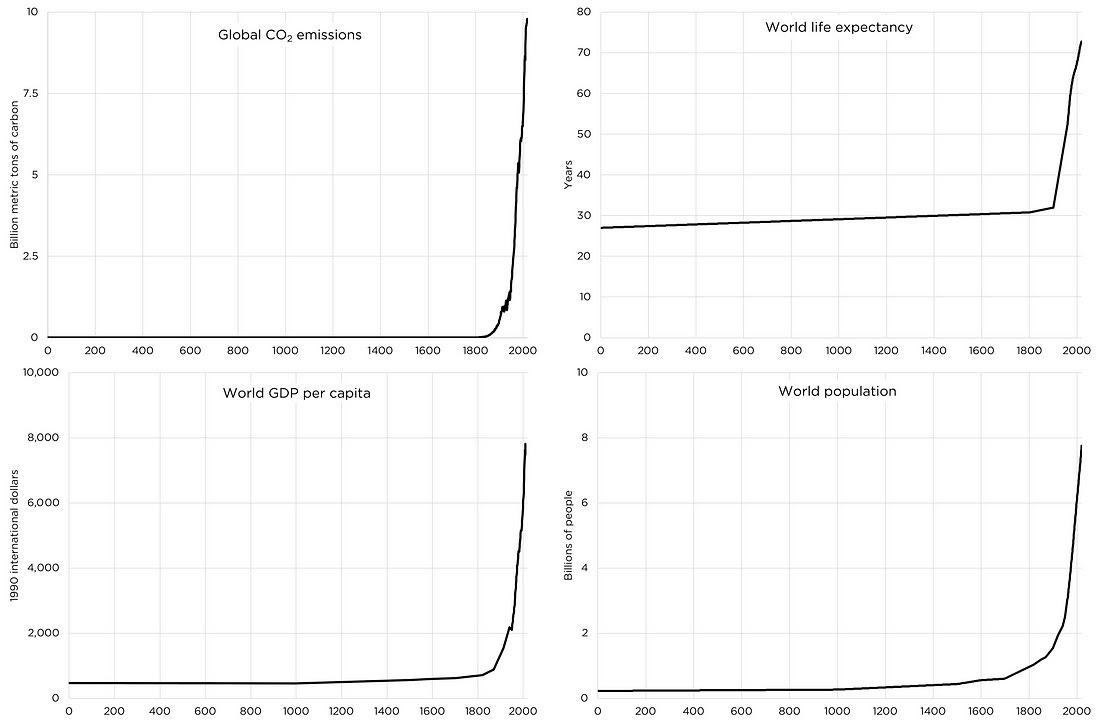


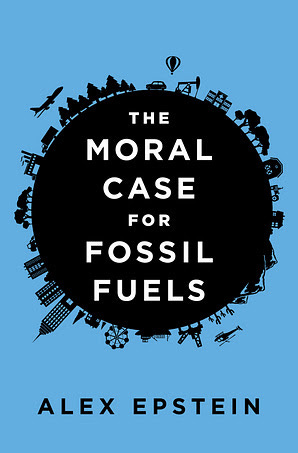
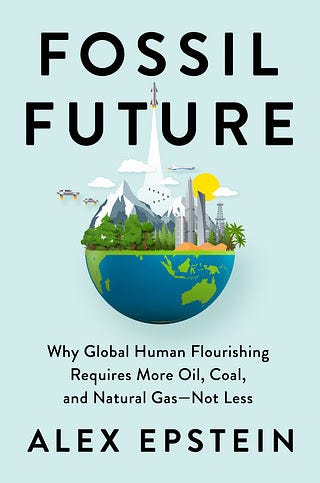

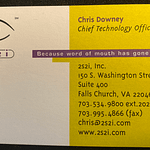



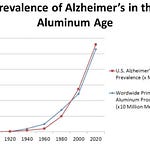



Share this post